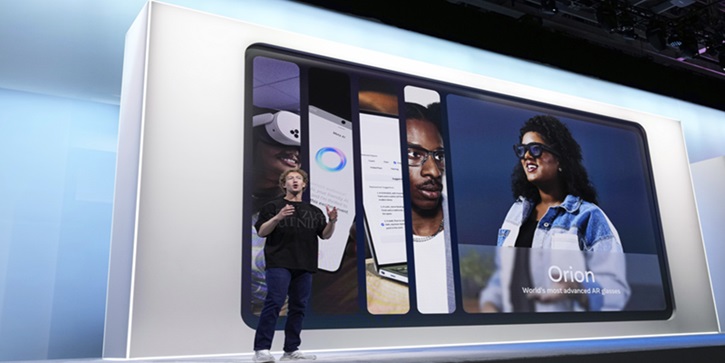It’s a company whose product I believe will disrupt Apple’s (AAPL) legendary iPhone business.
This is a revenge story—because Apple almost killed this company’s most profitable business a few years ago.
Apple has sold $1.6 trillion worth of iPhones. The iPhone has been the dominant computing medium for 17 years. But every 15–20 years, we get a new device that changes how we use computers.
First, we sat across the room from giant mainframe computers. Then we put big boxes called PCs on our desks. Along came laptops, making it possible to work from our couches.
Then the iPhone put a supercomputer in our pockets.
Spot the trend? Computers shrink, get closer to us, and integrate better with our lives with every new device. The next step is obvious: In the artificial intelligence (AI) age, they'll become part of what we wear.
They're actually a smartphone, equipped with an AI brain, squeezed into stylish frames you wear on your face.
Want to translate a menu in Paris? Ask your glasses. Need help fixing your sink? The AI walks you through it, step by step, with a graphical overlay.
Orion’s inward-facing cameras track your eyeballs, allowing them to work like a mouse. You simply look at the app you want to use, then “click” on it by pinching your thumb and index finger together. No tapping or swiping necessary.
My prediction: Meta's AI glasses will dethrone the iPhone.
A decade from now, we’ll simply talk to the AI assistant on our face, and it’ll do everything our phones can today.
We won’t all chuck our iPhones in the trash. Just like we still use PCs and laptops today, smartphones will be around for years to come.
But smart glasses are a natural fit to become the dominant computing device in the AI age.
Billions of people already wear specs. Nobody has to "get used" to some weird new device. We're just adding smartphone capabilities, supercharged by AI, to something we already wear.
You may remember Google Glass, the $1,500 pair of specs that made you look like a Star Trek extra and screamed, "I'm wearing a computer on my face."
People derided Google Glass wearers as “glassholes.” Among the many reasons for this, Google Glass aroused suspicions that a wearer was secretly filming you.
AI is what turns glasses from a gimmick into the next iPhone.
Meta’s Orion glasses are fitted with a screen that only shows what you need, when you need it. At your desk? A virtual workspace appears. Walking into a cafe? Instantly see the menu and reviews.
The built-in AI brain will also allow you to instantly translate languages and work from anywhere without a laptop.
One feature I can’t wait for: a note-taking assistant that summarizes the key insights from a long day of meetings. No more furiously scribbling down notes or having to rack your brain for what was said. Your AI buddy has you covered.
Instead of hunching over a phone, spine curved like a question mark, you’ll stand straight and look at the world. No more zombies bumping into each other while texting. Awesome!
Early signs are promising. Meta's smart glasses (without the full AI features) are already the #1 selling product in the majority of Ray-Ban stores across the world.
A decade ago, it started using AI tools to sort your photos and decide what shows up in your feed.
And did you know AI saved Meta from near death?
In 2021, Apple made big changes to its privacy rules on iPhones. It made it harder for Meta to track your data… making its ads worse and less valuable for advertisers.
This cost Meta billions of dollars, and its stock cratered 75%.
Shortly after Apple kneecapped it, Meta invented Advantage+. It’s an AI-powered ad tool that doesn't need to track you. It just predicts, with scary accuracy, what you'll buy.
It creates thousands of ad variations automatically, testing which ones work best. When advertisers place ads on Meta's platforms, AI matches them with the perfect audience.
Meta’s sales and stock price have since bounced back to new highs. It’s added $800 billion to its valuation since launching Advantage+:
Meta’s current market cap is $1.45 trillion. It’s worth the same as every building in New York City. As crazy as it sounds, Meta’s best days are ahead.
Zero.
It was 100% AI.
Meta already proved it can reinvent itself. It started as a social network, mastered mobile advertising, and is now becoming an AI powerhouse.
I guarantee this company will look unrecognizable a decade from now.
Meta could become the world's most valuable company within a few years. Just as the iPhone transformed Apple from a computer company into a trillion-dollar giant, AI can transform Meta from a social media company into the architect of computing's next chapter.
A pair of glasses that allows us to seamlessly interact with our AI assistants is the kind of breakthrough that vaults you to the top of the world-rich list.
Meta is the only big tech stock I’d own today. My big tech trade for the next five years: Long META; short AAPL.
Stephen McBrideChief Analyst, RiskHedge
PS: Meta is the kind of company I call a “disruptor.” It’s doing something different that will drastically change how we interact with the world… and even create a whole new market. For more deep dives on today’s top disruptor stocks, sign up to The Jolt today.


